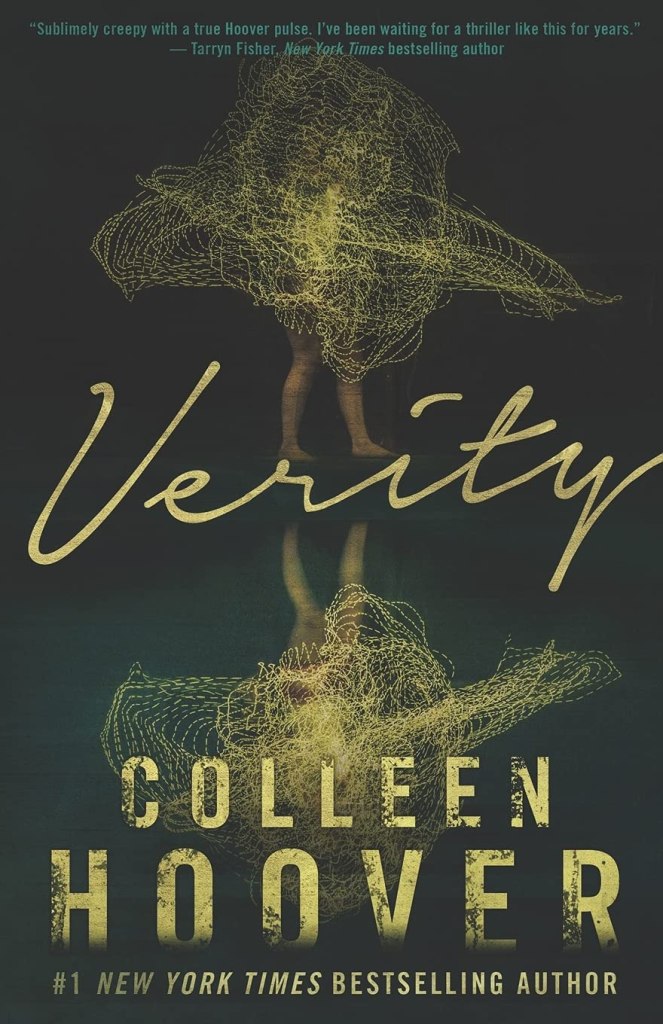This week I read Colleen Hoover’s psychological thriller, Verity, a book that had me reaching for a glass of scotch to sip whilst digesting the peculiar and somewhat horrific ending. For those of you who haven’t read it, please be warned that this post will contain spoilers, so do not venture beyond this point if you do not wish to ruin the plot twist.

Still here?
Now is your last chance to turn back…
Okay then. Here goes. For those of you who have read it, bear with me while I give a brief summary of the plot for the sake of discussion.
Verity is the story of introverted writer, Lowen Ashleigh, who is struggling with financial insolvency after the death of her sick mother. Lowen is approached to ghost write the last three novels of a series penned by acclaimed author, Verity Crawford. Her husband, Jeremy Crawford hires her because his wife was injured in an accident and is unable to complete the series.
Upon accepting the job, Lowen moves into the Crawford home to sort through Verity’s notes and comes across an unfinished autobiography of the author in which Verity reveals the dark machinations of a very disturbed mind, including a psychotic obsession with her husband, a jealous distaste for her children, and a confession to the murder of her daughter. Meanwhile, Verity remains in a semi-vegetative state, unable to speak or move, and has negligible mental awareness. However, the longer Lowen stays in the house, the more suspect she becomes of Verity’s condition and the more she falls in love with Verity’s husband, Jeremy.
Now we come to the horrific end, when Lowen and Jeremy discover that Verity has been faking her injuries and is in fact fully cognisant. Why, you might ask? Well, because Jeremy – having read and believed her autobiography – attempted to murder his wife to revenge his daughter’s death, first by strangling her, and then orchestrating a car accident. Upon the revelation that Verity has in fact been lying to them this entire time, Jeremy succeeds in killing her, and he and Lowen cover it up as an accidental death. However, six months later, Lowen comes across a hidden letter in which Verity confesses to her husband that the autobiography was a work of fiction, an exercise to help improve her writing. She was not a psychopath, and she never killed or endangered her children. This revelation leaves us, the reader, questioning which version of events to believe: the autobiography, or the letter?
The book was well written – I won’t argue that. Hoover does an exceptional job of sustaining suspense throughout the novel and plants numerous suggestions that Lowen is a less than reliable narrator. She takes anxiety medication, sometimes combined with liquor, and she often doubts her own observations (hearing footsteps, doors locking). All of Verity’s books are acclaimed for being written from the perspective of the antagonist, a subtle hint that the book you are reading could likewise be written from the perspective of the villain. To add further suspicion to the soundness of Lowen’s mind, our protagonist sleepwalks, and reveals that her own mother was terrified after witnessing one of her nighttime wanderings during which Lowen broke her wrist without appearing to notice. These narrative details – also referred to as red herrings – led me to believe that Lowen was the true psychopath, and was manipulating the entire narrative in order to mislead the reader: the quintessential unreliable narrator. This, unfortunately, wasn’t the case. A part of me wishes it were, but instead we are left to question whether to believe Verity’s book or her letter.
There are several flaws in logic with both of these realities, however, that I find dissatisfying and puzzling. If we are to believe the autobiography is true, and that Verity is a ‘veritable’ psychopath (note the choice of name – it was most certainly intentional), she went to considerable lengths to hide her psychopathy from her husband. Her modus operandi was to distort and conceal the truth under the “counterfeit thoughts” she admits to detesting in the autobiography’s introduction. So then why write an honest autobiography and risk exposure? She certainly wouldn’t have done it as a writing exercise at the prompting of her editor, as she claimed in her letter.
If we are to believe the letter, and that the autobiography was a piece of fiction, we have to believe that she faked her injuries, and feigned being in a semi-comatose state for MONTHS. I have a hard time believing this is humanly possible, even if she feared for her life. It is, I would argue, physically impossible to override basic reflexes (like flinching at loud sounds) and lie prone for hours, even days on resolve alone. Secondly, Verity claimed that Jeremy would either kill her or charge her with the murder of her daughter using the missing copy of her autobiography as proof, and this is why she faked her injuries. But why go to such theatrical measures? She had enough money to hire a competent lawyer who could defend her, using her editor’s testimony that she had in fact prompted Verity to try ‘antagonistic journaling’ as part of her defence. The character’s actions were just a little too far-fetched to make it soundly believable. However, the histrionic plot wasn’t enough to diminish my enjoyment of the story, and I salute Hoover for writing such a gripping read. In then end, I will take my stand on the side of the autobiography.

Even having read your whole blog, I’m intrigued enough with the book to want to read it. Enjoyed all of your comments on the book. Will let you know what I thought of it!!
LikeLike
I had not plans to read this book until now.. Fantastic review!
LikeLike